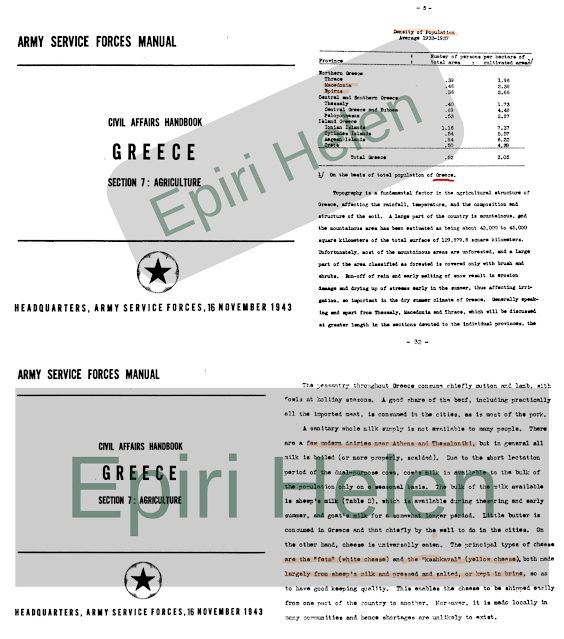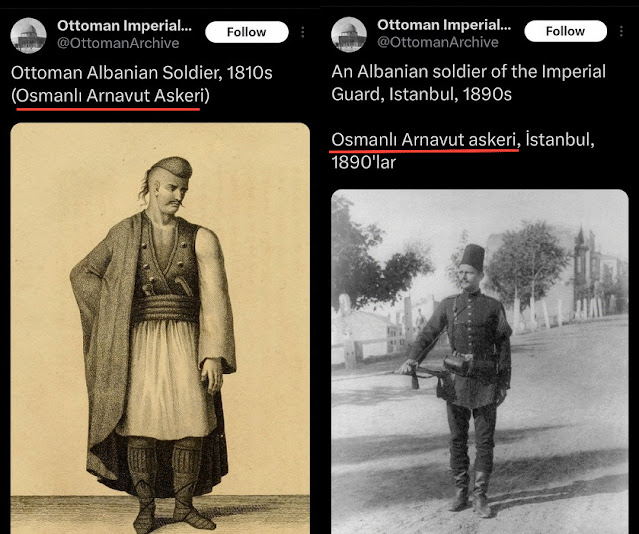The British Counsil of Ioannina, Robert Stuart has written a report on the resources of Epirus in 1869.
He writes: "The soil consists of limestone detritus washed down from the impending heights, and eminently suits the olive and the vine, produces abundant Crops of rye and barley, and affords excellent pasture for sheep and cattle"
Këshilltari Britanik i Janinës, Robert Stuart ka shkruar një raport mbi burimet e Epirit në 1869.Ai shkruan: "Toka përbëhet nga mbetje guri gëlqeror të larë nga lartësitë e afërta dhe i përshtatet jashtëzakonisht ullirit dhe hardhisë, prodhon të korra të bollshme thekër dhe elbi dhe ofron kullota të shkëlqyera për delet dhe bagëtinë".
The author writes that Albanian in the North had no manufacturers, were armed and involved in vendettas. They cultivated some Indian corn...
Italian Newspaper L'Economista in 1914 writes:
"As for imports, also in exports of Epirote goods Italy retains first place" and " The item that gives the greatest contribution to Epirote exports to Italy is the salted pecorino cheese in forms (called "manur") for a value of 2,150,000 gold francs"
" The value of imports to Epirus in 1914 amounted to 10,700,000 gold francs while that of exports was 5,302,000 gold francs: in total the Epirote trade movement rose in the year 1914 to 16,062,000 gold francs"
Epirote goods were being sold to Italy, Austria, Germany, England, France, Switzerland, Turkey, Greece and even America. Albania is not mentioned at all.
Gazeta italiane L'Economista në vitin 1914 shkruan:
“Përsa i përket importeve, edhe në eksportet e mallrave Epirote Italia ruan vendin e parë” dhe “Artikulli që jep kontributin më të madh në eksportet Epirote drejt Italisë është djathi pecorino i kripur në formen (i quajtur “manur”) për një vlerë prej 2,150,000 franga ari”.
"Vlera e importeve në Epir në vitin 1914 arrinte në 10.700.000 franga ari, ndërsa ajo e eksporteve ishte 5.302.000 franga ari: në total lëvizja tregtare epirote u rrit në vitin 1914 në 16.062.000 franga ari".
Mallrat Epirote shiteshin në Itali, Austri, Gjermani, Angli, Francë, Zvicër, Turqi, Greqi e deri në Amerikë. Shqipëria nuk përmendet fare.
Albanians claim that they produced cheese and that Greeks bought the cheese from Albanians. No. Albanians had no means of producing anything.
The principal merchants were Greeks of Epirus. They sold meat, cheese, had horses. cultivated vines, olives, oranges, lemons, figs and more.
Albanians had no manufacture, they did embroidery, fire arms, capotes and guns.
Shqiptarët thonë se ata bënin djathë dhe se Grekët e blinin prej tyre. Jo. Shqiptarët nuk prodhonin.
Tregtarët kryesorë ishin Grekët e Epirit. Ata kishin kuaj dhe shisnin mish dhe djathë. prodhonin ullinj, fiq, portokall, limon dhe hardhi, ndër fruta të tjera.
Pavarësisht mungesës së prodhimit, Shqiptarët prodhonin armë, kapele, punime me gjilpërë dhe armë zjarri.
Several Italian sources confirm that Epirotes were the ones who were producing the Pecorino cheese from sheep's milk and it was called "manur".
Burime te ndryshme Italiane konfirmojnë se Epirotët ishin ata që prodhonin djathin Pecorino nga qumështi i deleve dhe quhej "manur".
Italian author refers to the people of Epirus as Albanians. However, he claims that Muslims work with weaponry and serve as the Sultan's guards, and beys while Orthodox Christians, or Tosks (the latter are not Albanian but Epirote), work in agriculture. The author notes that wool and leather had markets in Trieste (Northern Italy), and that pecorino cheese was traded from Epirus to Italy.
But Orthodox Christians are not Tosks. Orthodox Christians are Epirotes.
Autori Italian i referohet popullit të Epirit si Shqiptar. Megjithatë, ai shkruan qe musulmanët punojnë me armatim dhe shërbejnë si roje të Sulltanit dhe bejlerëve, ndërsa të krishterët Ortodoksë, ose Toskët (Tosket nuk Jane Ortodokse e ka fjalen, per Epirotet), punojnë në bujqësi. Autori vëren se leshi dhe lëkura kishin tregje në Trieste (Italia e Veriut) dhe se djathi pecorino tregtohej nga Epiri në Itali.
Italian letters of Diplomats published at the Giornale d'Italia in 1903 writes:
"The major export from Epirus to Italy is cheese. The sad political and economic conditions of Epirus, which is naturally fertile, mean that sheep farming prevails over all other industries, so much so that in the vilayet of Jánina there are almost two million sheep. From this a large production of cheese pecorino (cheese made with sheeps milk), which partly, soft and in brine, is sent to Malta and Egypt, a much larger part, reduced to forms with an average weight of five kilograms and very salty, called manur, is almost entirely absorbed by southern Italy and especially by Puglia...
In 1901, 812,510 kilograms of cheese were sent to Italy from the ports of Preveza, Santi Quaranta, Parga, Saranda and Valona, with a total value of 812,510 gold francs, that is, 62,510 francs more than the previous year. "
Letrat italiane të diplomatëve të botuara në Giornale d'Italia në vitin 1903 shkruan:
"Eksporti kryesor nga Epiri në Itali është djathi. Kushtet e trishtueshme politike dhe ekonomike të Epirit, i cili është natyrshëm pjellor, do të thotë se kultivimi i deleve mbizotëron mbi të gjitha industritë e tjera, aq sa në vilajetin e Janinës ka pothuajse dy milionë dele. Nga ky një prodhim i madh djathi pecorino (djathë i bërë me qumësht deleje, pjesërisht i butë dhe në masë të madhe, malësor, i dërguar në Egjipt). pjesa, e reduktuar në forma me një peshë mesatare prej pesë kilogramësh dhe shumë e kripur, e quajtur pleh organik, përthithet pothuajse tërësisht nga Italia e Jugut dhe veçanërisht nga Pulia...
Në vitin 1901 në Itali u dërguan 812 510 kilogramë djathë nga portet e Prevezës, Santi Quaranta, Parga, Saranda dhe Valona, me një vlerë totale prej 812 510 franga ari, pra 62 510 franga më shumë se një vit më parë.

US Army Document shows that Epirus and Macedonia are part of Greece and that cheese like Feta and Kashkaval was being produced in Athens and Saloniki.
Dokumenti i ushtrisë Amerikane tregon se Epiri dhe Maqedonia janë pjesë e Greqisë dhe se djathi si Feta dhe Kashkavali prodhohej në Athinë dhe Selanik.
According to this US Army Document ten percent of the sheep were kept in Epirus and Epirotes were busy with animal husbandry.
"Both in numbers of animals kept and in dairy products output , Epirus exceeds the national average per capita production and per unit of land utilized , despite the relatively primitive nature of the animal husbandry methods . Ten percent of all the sheep and goats in Greece are kept in Epirus."
No mention of Albanians or their production.
Sipas këtij dokumenti të ushtrisë Amerikane, dhjetë për qind e deleve mbaheshin në Epir dhe Epirotët ishin të zënë me blegtori. Si në numrin e kafshëve të mbajtura ashtu edhe në prodhimin e produkteve të qumështit,
"Epiri tejkalon mesataren kombëtare të prodhimit për frymë dhe për njësi toke të shfrytëzuara, pavarësisht natyrës relativisht primitive të blegtorisë metodat. Dhjetë për qind e të gjitha deleve dhe dhive në Greqi mbahen në Epir,"











